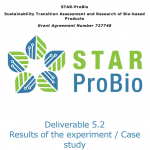Efforts to promote a sustainable bioeconomy seek to enable markets that create value from renewable resources while satisfying sustainability requirements. Despite recent progress in several European countries in launching strategies to support a bioeconomy, market demand for bio-based products remains moderate. More analysis is required to better understand the drivers and barriers for enabling consumer demand for bio-based products, in particular as this relates to consumers’ sustainability concerns. A previous report developed within the scope of the STAR-ProBio project has presented the results of two rounds of a Delphi survey aimed at better understanding the sustainability preferences of procurement professionals and end consumers. Building on these results, the following tasks were completed: a third and final round of the Delphi survey was conducted with procurement professionals and a framed field experiment was conducted with end consumers to identify their willingness to pay a premium for different types of bio-based products with and without sustainability certification. This report presents the results from these tasks. In particular, it covers findings on the following: i) the relevance of information on final disposal and ii) preferences regarding information on the bio-based raw materials used, including questions related to the share and origin of bio-based raw materials and the form in which this information is communicated. In addition, the report discusses survey results on sustainability principles and potential policy options to promote the demand for bio-based products. The field experiment conducted on three products, i.e. coloured pens, hand soap and food storage bags shows that on average end consumers assign a higher price for bio-based products than conventional ones.

